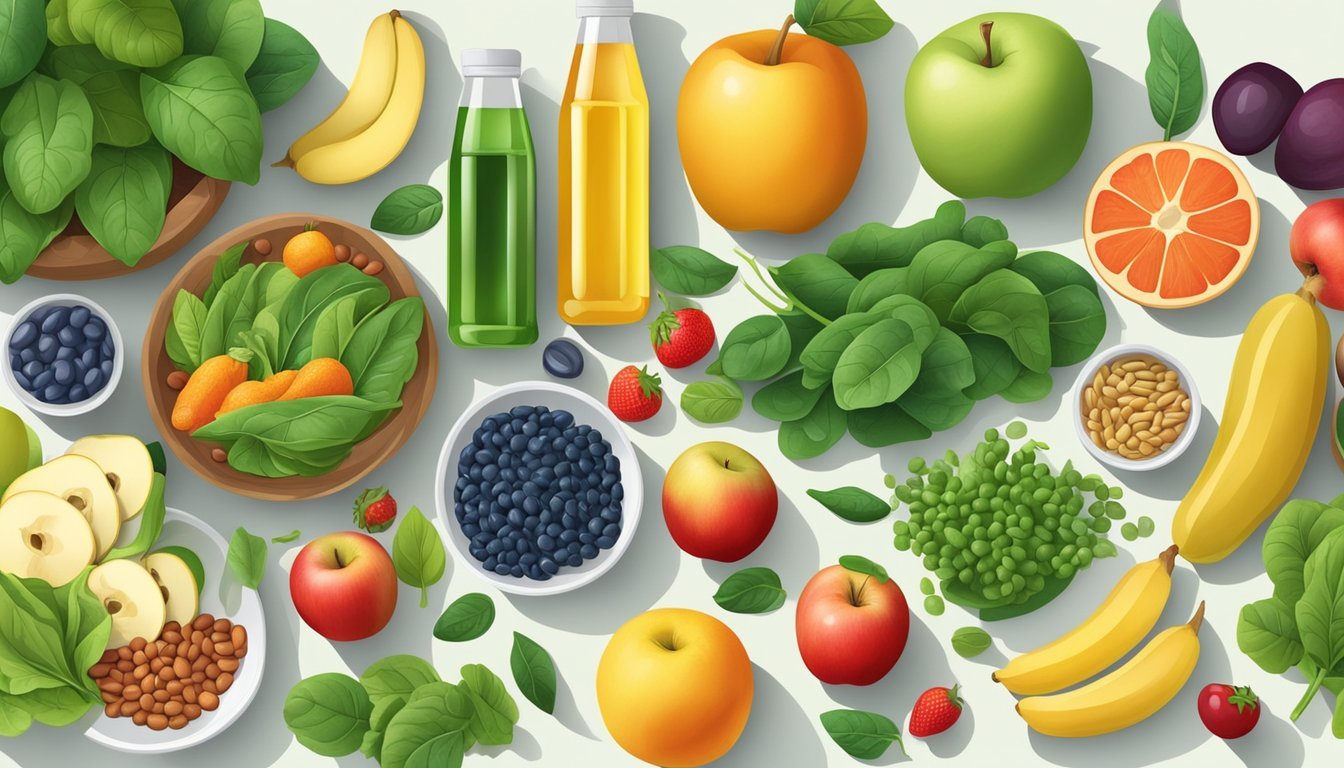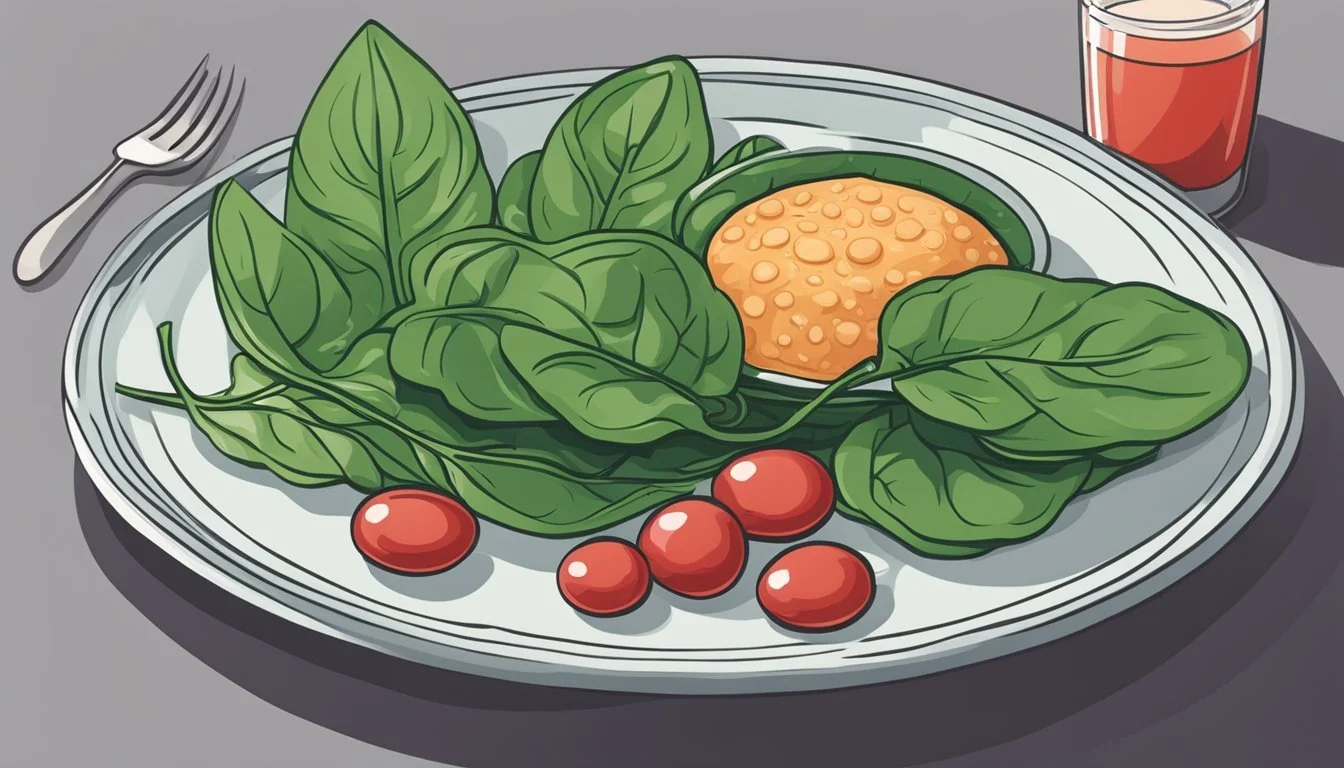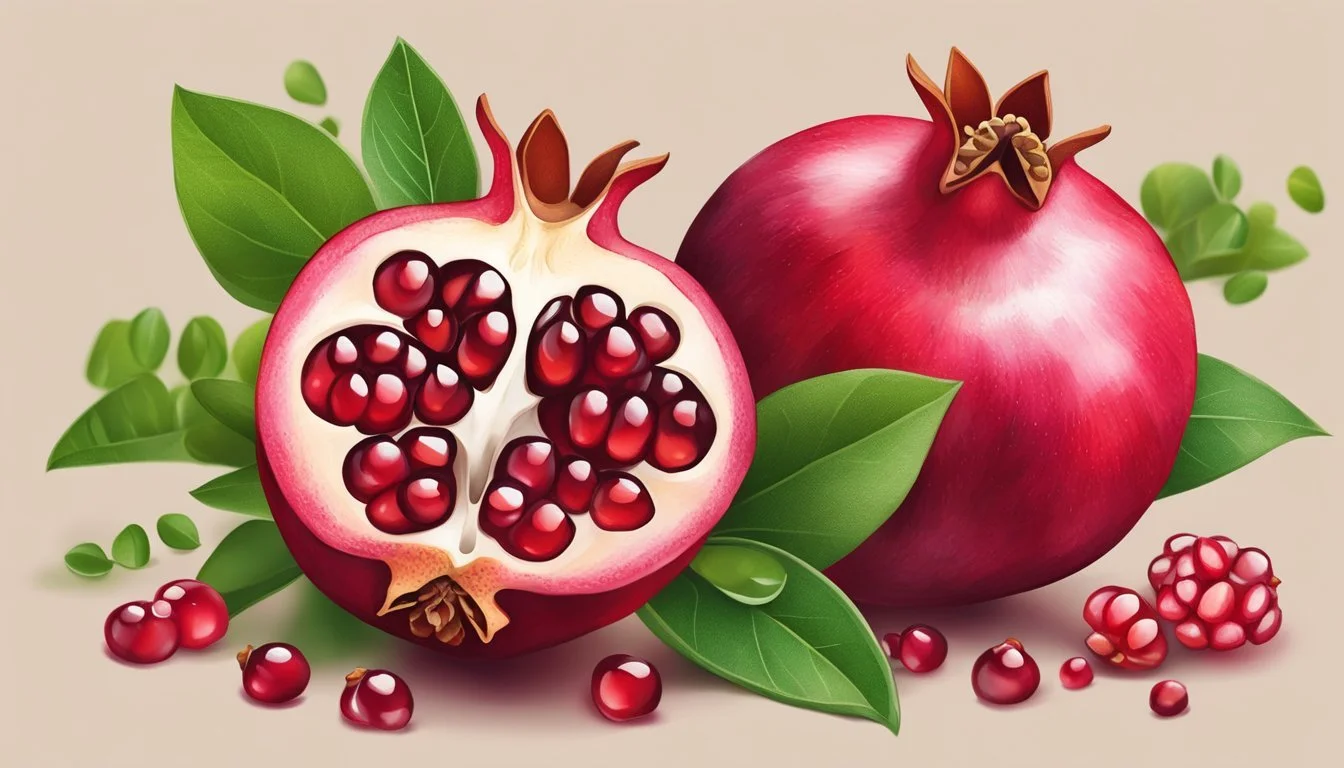Iron-Rich Foods to Boost Your Hemoglobin Levels Naturally
Hemoglobin is a crucial protein in red blood cells responsible for transporting oxygen throughout the body. Maintaining adequate hemoglobin levels is essential for overall health, as low levels can indicate anemia or other underlying conditions.
Certain foods can play a key role in boosting hemoglobin levels naturally. By incorporating these foods into your diet, you can support your body’s ability to produce and maintain healthy hemoglobin levels, ensuring efficient oxygen transport and overall well-being.
1) Spinach
Spinach is a nutrient-dense leafy green that is highly recommended for increasing hemoglobin levels. This vegetable is rich in iron, an essential component of hemoglobin. Iron helps in the production of red blood cells and improves oxygen transport in the body.
Including spinach in the diet is simple and versatile. It can be added to salads, blended into smoothies, or cooked into soups. Boiling spinach and seasoning it with your favorite spices can make for a delicious and healthy meal.
Apart from iron, spinach also contains vitamin C, which enhances iron absorption. Consuming foods rich in both iron and vitamin C is beneficial for those looking to boost their hemoglobin levels effectively.
2) Lentils
Lentils are a nutritional powerhouse that can help increase hemoglobin levels. They are rich in iron, which is vital for the production of hemoglobin in red blood cells. Including lentils in the diet can be particularly beneficial for those with iron deficiency anemia.
Apart from iron, lentils also provide a substantial amount of protein. This makes them a great plant-based alternative for those who prefer not to consume meat. The high protein content of lentils supports overall health by playing a key role in various bodily functions.
Lentils also contain a variety of other important nutrients, such as fiber, vitamins, and minerals. The fiber in lentils aids in digestion and helps maintain stable blood sugar levels, which can indirectly support overall health. Consuming lentils regularly can contribute to a well-rounded, nutrient-rich diet.
3) Tofu
Tofu is a valuable food for increasing hemoglobin levels, primarily due to its rich iron content. It serves as an excellent source of non-heme iron, which is derived from plant-based foods.
This soy-based product is especially useful for vegetarians and vegans. They often rely on non-meat sources to meet their iron needs.
In addition to iron, tofu provides other essential nutrients like protein and calcium. These nutrients support overall health and can indirectly aid in maintaining optimal hemoglobin levels.
To maximize iron absorption from tofu, it's beneficial to consume it alongside vitamin C-rich foods. Examples include bell peppers, tomatoes, and citrus fruits. This combination enhances the body's ability to utilize the iron found in tofu.
4) Almonds
Almonds are a nutritious choice for boosting hemoglobin levels.
Rich in iron, almonds contribute to the body's daily iron requirement. This makes them an excellent choice for people looking to manage and prevent anemia.
Almonds also contain vitamin E, a powerful antioxidant. While vitamin E does not directly influence hemoglobin levels, it supports overall blood health.
Incorporating almonds into meals or as snacks can be beneficial. They can be consumed raw, roasted, or added to salads and dishes.
For optimal benefits, a serving of almonds each day is recommended. It is a simple and delicious way to support iron intake and improve hemoglobin levels.
5) Beef liver
Beef liver is rich in iron, which is crucial for boosting hemoglobin levels. This organ meat contains heme iron, a type that is easily absorbed by the body. Iron is vital for producing hemoglobin, the protein in red blood cells responsible for carrying oxygen throughout the body.
Additionally, beef liver is high in Vitamin B12. Vitamin B12 plays a significant role in red blood cell production and preventing anemia. The combination of iron and Vitamin B12 makes it an excellent choice for those looking to increase their hemoglobin count.
Beef liver also contains other essential nutrients, including folate (Vitamin B9), riboflavin (Vitamin B2), and pantothenic acid (Vitamin B5). These vitamins contribute to healthy blood cell formation and energy production. Including beef liver in a balanced diet can be beneficial for maintaining optimal hemoglobin levels.
6) Pomegranate
Pomegranate is a powerful fruit known for its ability to increase hemoglobin levels in the blood. Rich in iron, vitamins, and antioxidants, it helps in promoting healthy blood flow.
Consuming pomegranate can be done in various ways. One popular method is drinking a glass of fresh pomegranate juice daily. This provides a concentrated source of iron.
Eating the whole fruit also offers additional fiber, which aids digestion. The seeds can be added to salads or smoothies, providing a versatile way to incorporate them into the diet.
Pomegranate supplements are an alternative, but it is always advisable to consult a healthcare professional before starting any supplementation. This ensures that it fits well with individual health needs and conditions.
7) Beetroot
Beetroot is a highly effective food for increasing hemoglobin levels. It is rich in iron, which is essential for the production of hemoglobin. Consuming beetroot regularly can help improve the red blood cell count.
In addition to iron, beetroot contains folic acid, fiber, and potassium. These nutrients work together to enhance the body’s ability to produce and maintain healthy blood cells. This makes beetroot a vital component of any diet aimed at combating anemia.
The natural nitrates in beetroot can improve blood flow and oxygen supply to the tissues. This helps in boosting the overall oxygen-carrying capacity of the blood. Including beetroot in salads, juices, or cooked dishes can be a tasty way to improve hemoglobin levels.
8) Quinoa
Quinoa is a nutritious whole grain rich in various essential nutrients, including iron. A single cup of quinoa provides 2.8 mg of iron, which can help support hemoglobin levels in the body.
Besides iron, quinoa is an excellent source of protein, containing all nine essential amino acids. This makes it a complete protein, beneficial for overall health.
Quinoa is also rich in other important nutrients like fiber, magnesium, and vitamins, contributing to a balanced diet.
Incorporating quinoa into meals is straightforward. It can be used as a base for salads, added to soups, or served as a side dish.
Its versatility and nutritional profile make quinoa a valuable addition to a diet aimed at improving hemoglobin levels.
For those with dietary restrictions, quinoa is naturally gluten-free, making it suitable for people with gluten intolerance or celiac disease.
Enjoying a varied diet that includes quinoa can play a role in maintaining healthy hemoglobin levels and overall well-being.
9) Shellfish
Shellfish are an excellent source of heme iron, which the body absorbs more efficiently than non-heme iron from plant sources. Including various types of shellfish, such as shrimp, crab, and clams, can significantly boost hemoglobin levels.
Clams, in particular, are one of the most concentrated sources of heme iron. They provide a substantial amount of iron, which the body uses to produce hemoglobin and red blood cells.
Crab and shrimp also contribute valuable iron content to the diet. Eating these shellfish can support hemoglobin production, especially in individuals with iron deficiency anemia. Additionally, they contain other important nutrients, such as zinc and vitamin B12, which are crucial for overall blood health.
Integrating shellfish into meals a few times a week can help maintain adequate hemoglobin levels. They can be prepared in various ways, making them a versatile addition to a balanced diet.
10) Egg yolks
Egg yolks are a rich source of iron, a key component in raising hemoglobin levels. Iron is essential for the production of hemoglobin, which helps in the transport of oxygen in the blood. Each large egg yolk contains about 0.4 mg of iron.
In addition to iron, egg yolks provide other nutrients that support hemoglobin production, such as vitamin B12 and folate. These nutrients are crucial for the formation of red blood cells.
The inclusion of egg yolks in a balanced diet can, therefore, play a role in combating iron deficiency anemia. Regular consumption of egg yolks along with other iron-rich foods may help maintain healthy hemoglobin levels.
Furthermore, egg yolks also contain protein, which supports overall health and wellbeing. While some may be concerned about cholesterol, moderate consumption of egg yolks has been shown to be beneficial for most individuals.
In summary, the nutritional profile of egg yolks makes them a valuable addition to a diet aimed at increasing hemoglobin levels and supporting overall health.
The Role Of Hemoglobin
Hemoglobin is vital for transporting oxygen from the lungs to various tissues and carbon dioxide from tissues back to the lungs. This protein also plays a crucial role in maintaining the shape and functionality of red blood cells.
Understanding Hemoglobin
Hemoglobin is a protein found in red blood cells. It consists of four subunits, each containing an iron ion that binds oxygen. When red blood cells pass through the lungs, hemoglobin binds to oxygen molecules and transports them throughout the body.
In the tissues, hemoglobin releases oxygen, which cells use for energy production and metabolic processes. It then picks up carbon dioxide from the tissues, a waste product of metabolism, and transports it back to the lungs for exhalation. The iron in hemoglobin is critical for these processes. Without adequate iron, hemoglobin levels can drop, leading to issues like anemia.
Importance For Health
Hemoglobin is essential for effective oxygen delivery in the body. Adequate hemoglobin levels ensure that tissues and organs receive the oxygen they need to function correctly. A drop in hemoglobin can cause symptoms such as fatigue, weakness, and shortness of breath.
Maintaining a healthy level of hemoglobin is particularly important for individuals with conditions such as anemia or chronic illnesses. Regular monitoring and maintaining good nutrition, rich in iron and vitamins, can help keep hemoglobin levels optimal. Foods like lean meats, beans, spinach, and fortified cereals are excellent choices to support hemoglobin function.
Nutrients That Boost Hemoglobin
Boosting hemoglobin levels involves incorporating specific nutrients into the diet. Key players include iron and vitamin C, which work in tandem for optimal absorption and utilization.
Iron-Rich Foods
Iron is essential for hemoglobin production. Including lean meats like beef, poultry, and fish in the diet can significantly aid in increasing iron levels. Plant-based sources are also beneficial and include beans, lentils, tofu, and fortified cereals.
Green leafy vegetables like spinach and broccoli are crucial as well. Moreover, consuming enriched bread and baked potatoes adds variety to the iron-rich diet. For individuals seeking a natural beverage option, nettle tea can also be a valuable addition due to its iron content.
Vitamin C For Better Absorption
Vitamin C enhances the body's ability to absorb iron. Foods rich in vitamin C include papayas, oranges, and lemons. Strawberries, bell peppers, and grapefruits are also excellent sources. Adding tomatoes and broccoli to meals not only provides vitamin C but pairs well with iron-rich foods for better absorption.
It is vital to include these vitamin C-rich foods in meals, especially when consuming plant-based iron sources, as they improve iron uptake. By combining these nutrients, individuals can effectively boost their hemoglobin levels naturally.
Dietary Tips For Optimal Hemoglobin Levels
Proper diet plays a crucial role in maintaining healthy hemoglobin levels. Consuming iron-rich foods and avoiding substances that hinder iron absorption can significantly impact hemoglobin.
Balanced Diet Recommendations
A balanced diet should prioritize iron-rich foods. Foods high in iron include lean meats like beef, poultry, and fish. Plant-based sources are also valuable; options include beans, lentils, tofu, spinach, and fortified cereals.
Incorporating foods rich in vitamin C is important as it enhances iron absorption. Citrus fruits, strawberries, bell peppers, broccoli, and tomatoes are excellent choices. Furthermore, folate-rich foods such as dark leafy greens, nuts, and seeds also contribute to the production of hemoglobin.
Lastly, consider heme iron sources (from animal products), which the body absorbs more efficiently compared to non-heme iron (from plant sources).
Foods To Avoid
Certain foods and beverages can interfere with iron absorption and should be consumed in moderation. Coffee and tea contain polyphenols, which can inhibit iron absorption. Calcium-rich foods like dairy products can also have a similar effect when eaten in large quantities with iron-rich meals.
Avoid excessive intake of high-fiber foods, such as whole grains and bran, around meals high in iron since fiber can trap iron and prevent its absorption. Similarly, foods that contain oxalates (like spinach and certain nuts) should be balanced with other iron sources as they can reduce iron absorption.





